A Little this, a Little _that:
Understanding Scope and Context in JavaScript
@davidmaragon




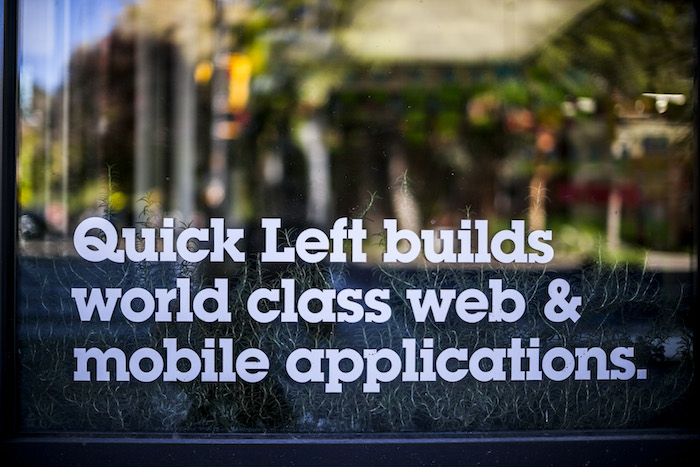

davidql.github.io/scope_talk
Code sample:
function() {
alert("code will be this big");
}
Road Map
(Is This Talk for Me?)
- Scope from the ground up
- The magic variable `this`
- What is context?
- The future with EcmaScript 6
Let's look at scope from the ground up
What is scope?
Scope: the lifetime of a variable
function add(n1, n2) {
var sum = n1 + n2;
if (true) {
var sum = 42;
}
return sum;
};
Scope in Pseudocode
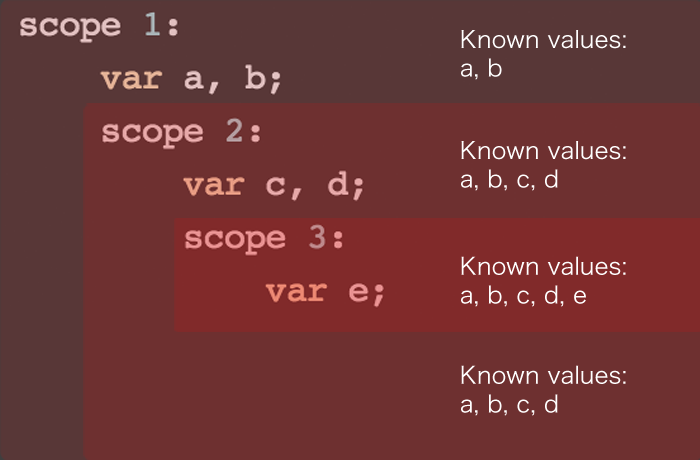
JavaScript does NOT use block scope
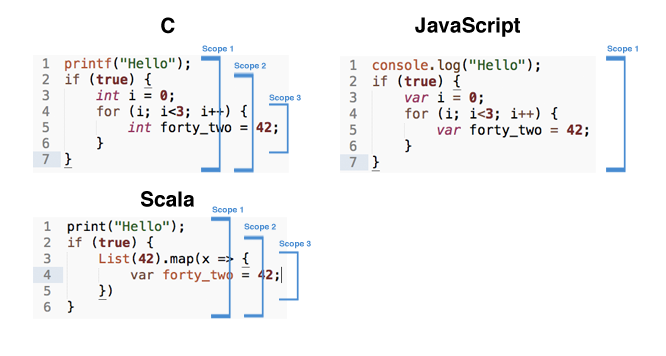
JavaScript uses functional scope:
function add(number1, number2) {
// anything inside is local
var sum = number1 + number2;
};
For a variable to be local, it must:
- Be declared with `var`
- Be declared inside a function
function add(number1, number2) {
var sum = number1 + number2;
};
Scope trick: Self-Invoking functions
(function() {
// This function runs the second
// it's encountered.
// Gives me a private scope on demand
})();
Self-Invoking functions
// Step 1: normal function
function() {};
// Step 2: wrap the whole thing in parentheses
(function() {});
// Step 3: call your function!
(function() {
// private scope
})();
Let's play GUESS THAT SCOPE

What gets printed?
var episode_1 = "Winter Is Coming";
if (true) {
var episode_1 = "The Kingsroad";
}
console.log(episode_1);
"The Kingsroad"
var episode_1 = "Winter Is Coming";
if (true) {
var episode_1 = "The Kingsroad";
}
console.log(episode_1);
// "The Kingsroad"
What gets printed?
var episode_1 = "Winter Is Coming";
(function() {
var episode_2 = "The Kingsroad";
})();
console.log(episode_2);
Error: episode_2 is not defined
var episode_1 = "Winter Is Coming";
(function() {
var episode_2 = "The Kingsroad";
})();
console.log(episode_2);
// Error: episode_2 is not defined
What gets printed?
var episode_3 = "Lord Snow";
function printName(episode_3) {
console.log(episode_3);
}
printName("A Golden Crown");
"A Golden Crown"
var episode_3 = "Lord Snow";
function printName(episode_3) {
console.log(episode_3);
}
printName("A Golden Crown");
// prints: "A Golden Crown"
If only it were that easy

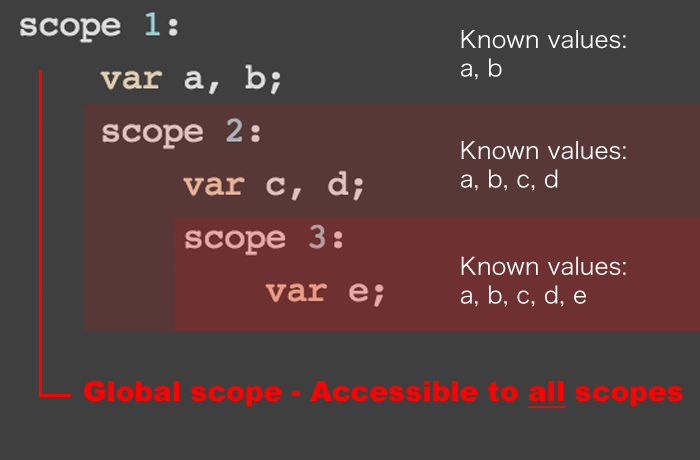
A variable is global if it is not:
- Declared with `var`
- Declared inside a function
var episode_1 = "Winter Is Coming";
(function() {
// declaring without var
episode_2 = "The Kingsroad";
})();
console.log(episode_2);
// "The Kingsroad"
Why is global scope so bad?

"Browsers are the most hostile software development environment imaginable". -Douglas Crockford
- Everyone has access to the global scope
- 3rd party code can change your values at any time
The Dangers of Global Scope
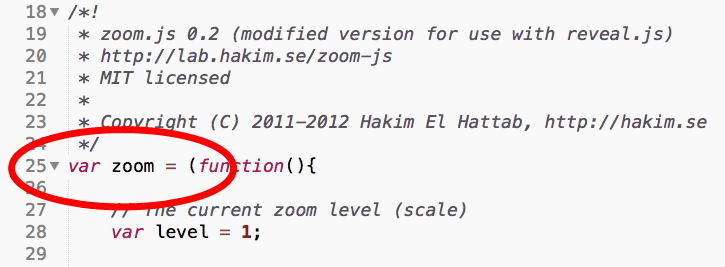
 http://blog.safeshepherd.com/23/how-one-missing-var-ruined-our-launch/
http://blog.safeshepherd.com/23/how-one-missing-var-ruined-our-launch/
Detecting Globals
Object.keys(window);
// ["top", "window", "location",
// "external", "chrome", "document", ...
- If a function is a sentence, the context is the subject of that sentence. It's who the function is about.
- We access the context through the variable `this`.
- We're used to lexical scoping (where we can see the value of a variable in the visual scope).
- `this` uses dynamic scoping, which we're less used to thinking about.
- But we all kinda sorta know what `this` should be.
$('button').on('click', function() {
$(this).addClass('was_clicked');
// $(this) refers to the button the was clicked
});
$('a.disabled').each(function() {
$(this).remove();
// $(this) refers to the current anchor
// element in our loop of the matched set
});
4 ways to set the value of `this` in a function
4 ways to set the value of `this` in a function
- Call a method *on* an object
- Pass `this` in, with .call() and .apply()
- Use `new` to make `this` start out empty
- .bind() `this` with 3rd party methods
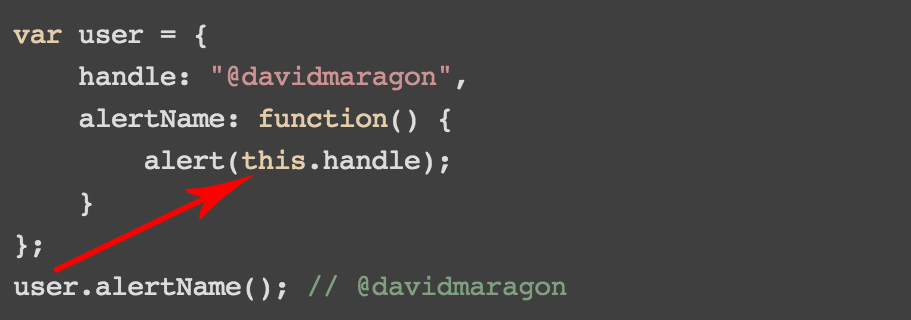

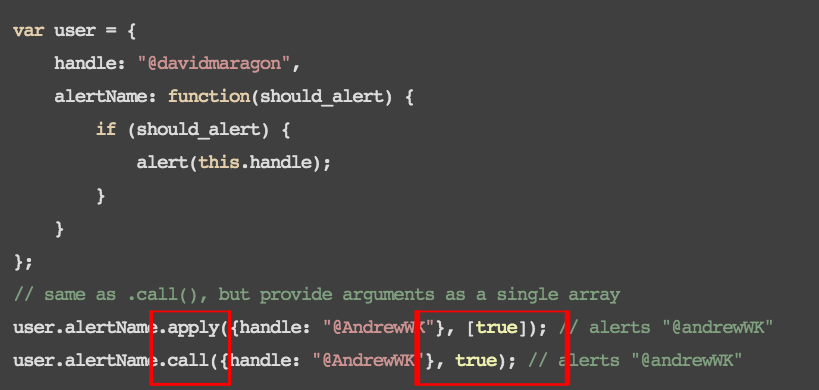
function User(handle) {
this.handle = handle;
}
var andrew = new User("@AndrewWK");
// andrew === {handle: "AndrewWK"}
var alertName = function() {
alert(this.handle);
}
$.proxy(alertName, {handle: "@AndrewWK"})();
// alerts "@AndrewWK"
Performance
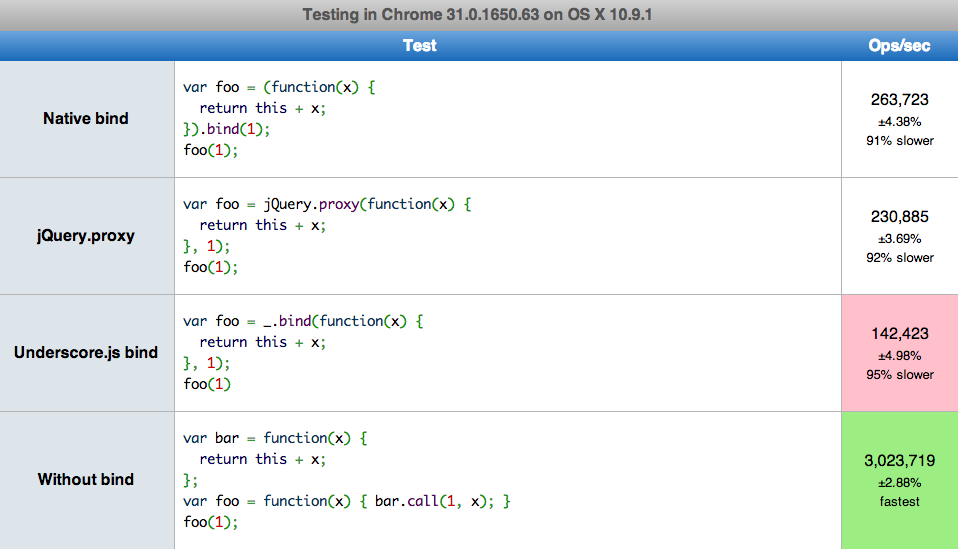
on jsPerf: http://jsperf.com/bind-vs-jquery-proxy/5
4 ways to set the value of `this` in a function
- Call a method *on* an object
- Pass `this` in, with .call() and .apply()
- Use `new` to make `this` start out empty
- .bind() `this` with 3rd party methods
- If none of the above are used, `this` is global object
Let's play GUESS THAT CONTEXT

What is `this`?
(function() {
console.log(this);
})();
It's global object
(function() {
console.log(this);
// Window {top: Window, window: Window, location: ...
})();
What is `this`?
var background_colors = ["green", "blue", "red"];
(function() {
console.log(this);
}).call(background_colors);
It's `background_colors`
var background_colors = ["green", "blue", "red"];
(function() {
console.log(this);
// ["green", "blue", "red"];
}).call(background_colors);
What is `this`?
var user = {
print: function() {
console.log(this);
}
};
user.print();
It's `user`
var user = {
print: function() {
console.log(this);
}
};
user.print();
// Object {print: function}
`this` in jQuery source
$("div.disabled").each(function(index) {
console.log(this + " is element " + index);
});
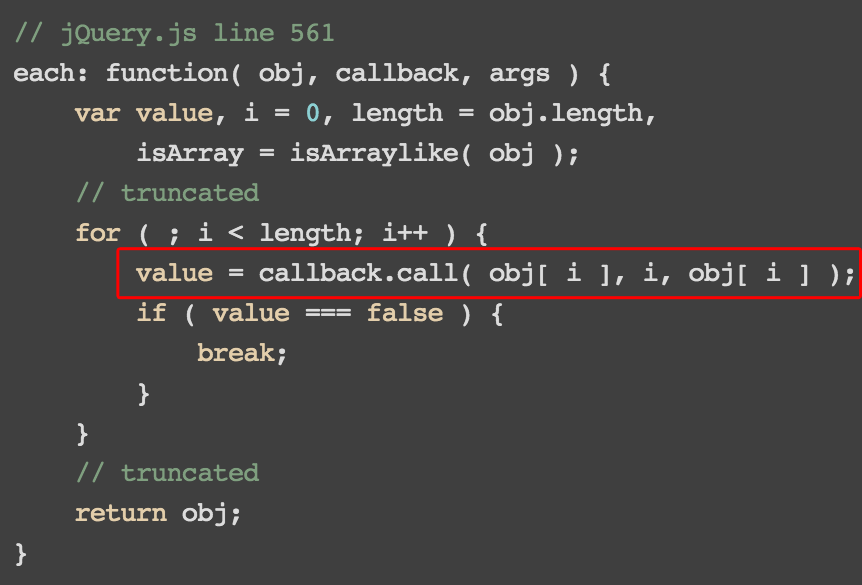
Annotated $().each()
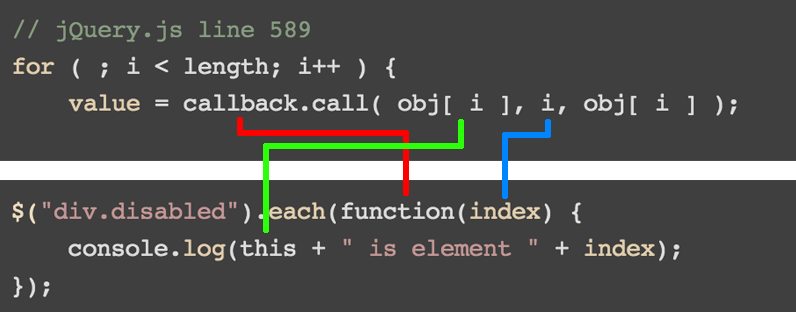
Beware of Callbacks
$('button').on('click', function() {
setTimeout(function() {
// Uh oh! `this` is the global object!
$(this).addClass('clicked');
}, 1000);
});
Dealing With Callbacks
Using `_this` and `_that`
$('button').on('click', function() {
var _this = this;
setTimeout(function() {
$(_this).addClass('clicked'); // All better
}, 1000);
});
Our Future With EcmaScript 6
- `let` allows block scope (!)
- Arrow functions pull context from scope
`let` gives a variable block scope
// EcmaScript 6
if (true) {
let local_var = "I'm local to the if block!";
}
console.log(local_var); // Error: undefined local_var
Browser support for `let`:
| Chrome | 19+ (expiremental flag enabled) |
| Firefox | 24+ |
| Safari | No Support |
| IE | 11+ |
| Node (0.10.26) | No Support |
Arrow Functions
// current (ES5) declaration
var myFunc = function(params) { }
// arrow function
var myFunc = (params) => { }
Without Arrow Functions (ES 5)
$('button').click(function() {
var _this = this;
setTimeout(function() {
// lookup _this from parent scope
$(_this).addClass('clicked');
}, 1000);
});
With Arrow Functions
$('button').click(function() {
setTimeout(() => {
$(this).addClass('clicked');
}, 1000);
});
Browser support for arrow functions:
| Chrome | No support |
| Firefox | 24+ |
| Safari | No Support |
| IE | No support |
| Node (0.10.26) | No Support |

Where to go from here
Where to go from here
- You know all the rules.
-
These two concepts underlie important developments in client-side coding:
- Modules that mix private vars with public exports (like RequireJS)
- Full fledged MVCs in the browser, like Backbone
- Functional programming toolbelts like Underscore.js
Thank you!

@davidmaragon